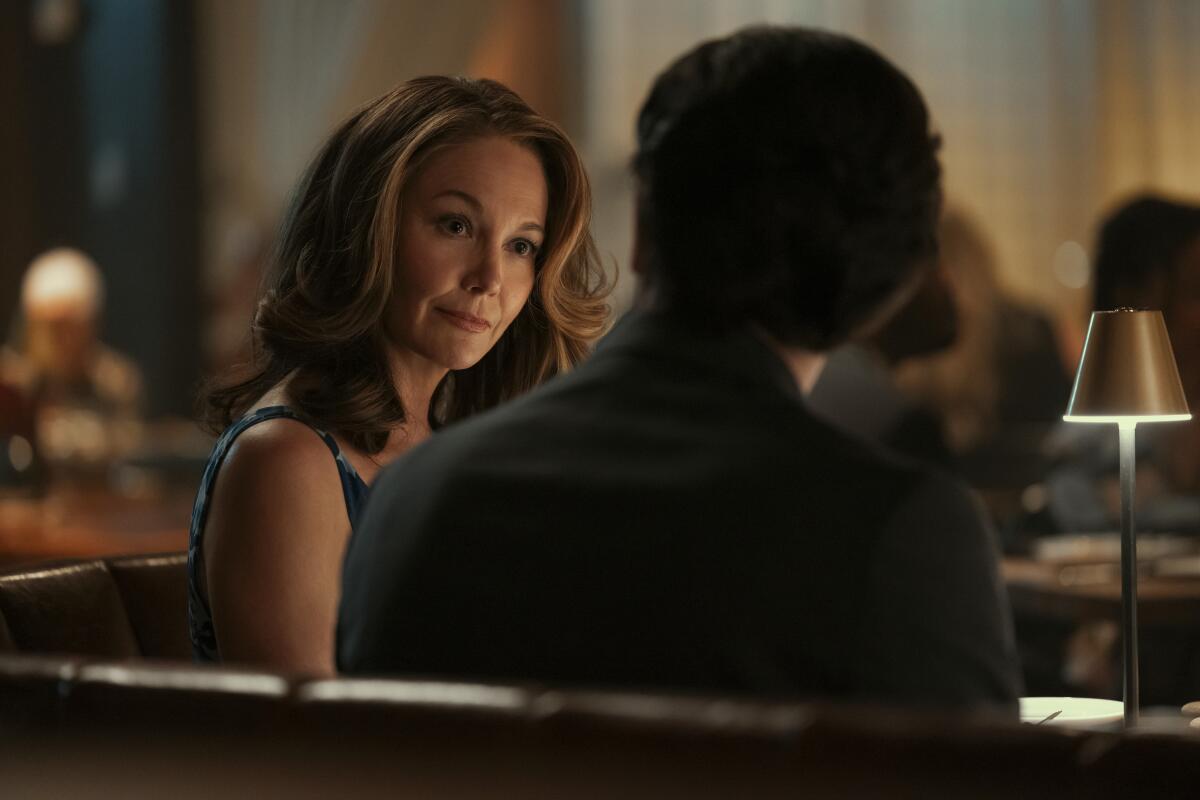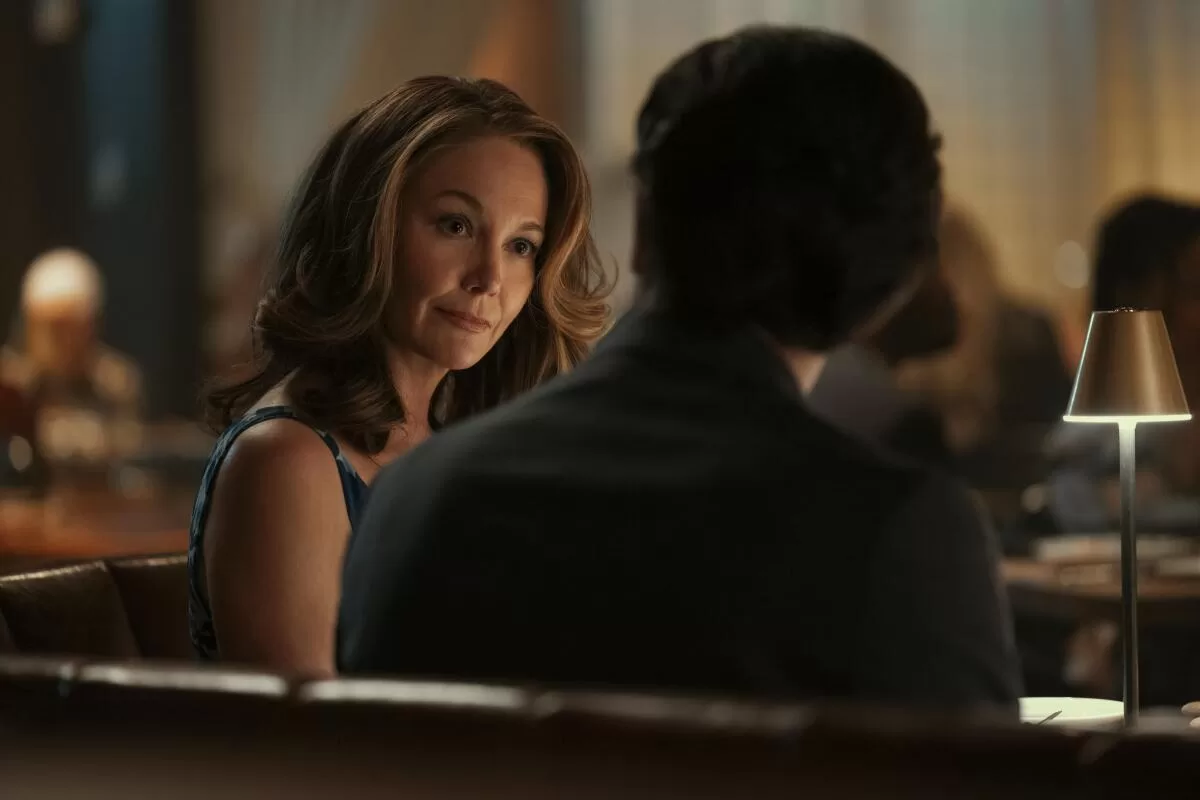Now David E. Kelley has written a television miniseries, premiering Thursday on Netflix, with similar characters in similar situations in the same setting, but so much is different, lost or added that adaptation hardly seems the right word. “David E. Kelley’s Tom Wolfe’s ‘A Man in Full’” might be closer to the mark.
Jeff Daniels stars as Charlie, a former college football star and celebrated businessman, whom we meet at his 60th birthday party being serenaded by Shania Twain. He has a young wife, Serena (Sarah Jones), an ex-wife Martha (Diane Lane), and a teenage son, Wally (Evan Roe), who has been suspended from school for expressing nonconformist thoughts.

(Mark Hill / Netflix)
He has private planes, a big house in leafy Buckhead, a country place called Turpmtine [sic] where he shoots quail and studs horses, and a skyscraper that ostentatiously bears his name, Croker Concourse. He also has debt amounting to more than a billion dollars and a bank that wants its money, stat. Oh, and a bad knee. Though the details are different, and Wolfe evidently had Atlanta figures in mind as models, one’s thoughts float easily toward Donald Trump, given the profession, the tower and the debt. And the narcissism, of course.
Charlie’s appointed persecutors are Raymond Peepgrass (Tom Pelphrey), a weedy midlevel bank officer who was involved in writing his loans and now is gleefully assisting in his downfall, and Harry Zale (Bill Camp), who specializes in working over big-shot deadbeats. Raymond, in his Dean Cain Clark Kent Collection glasses, and Harry, doing push-ups on his office floor, are caricatures of weakness and aggression.
Down among the little people, we find Conrad (Jon Michael Hill) driving a forklift in a Croker warehouse. Attempting to keep his car from being towed, he tussles with a policeman, and winds up in jail awaiting trial, surrounded by dangerous characters. In Kelley’s rejiggered flow chart, Conrad’s wife, Jill (Chanté Adams), has become Charlie’s executive secretary. Conrad and Jill, who are white in the book — and living in California — are Black in the series, which gives their storyline, heavily altered in other respects, a different sociopolitical flavor. (Charlie has his faults — indeed, he’s almost nothing but faults — but racism is not among them.) They are, unlike most of the people here, morally straight and pure of heart.
Meanwhile! Atlanta mayor Wes Jordan (William Jackson Harper) has called upon his old friend Roger White (Aml Ameen), whom Kelley also has working for Charlie as a general counsel, to help in a scheme to ensure his reelection — a scheme that requires the participation of Charlie, whose woes are not yet public and whom Atlanta reveres as a football hero.

Conrad (Jon Michael Hill), left, and Jill (Chanté Adams) are among the characters whose backgrounds differ in the series from those in the book.
(Mark Hill / Netflix)
Performative manliness, which is to say sexual insecurity, is practically the theme of the series, expressed in petty power plays and phrases unrepeatable here except by tortuous euphemism, when one man describes what he’s going to do to another man by way of humiliating him. (Dudes are such children.) Conversely Kelley has given the women — including Lucy Liu as Martha’s friend Joyce, Jerrika Hinton as Roger’s wife, Henrietta, and Eline Powell as Sirja, who has a paternity suit against Raymond — more dimension and agency than Wolfe thought to. And they’re mostly decent.
If we take the position that character is as important, or more important, than plot, “A Man in Full” succeeds at least in that it gives Daniels a role to make a meal of. He brings Wolfe’s Charlie to bigger-than-life life, and manages even to evoke a viewer’s sympathetic interest, between conscientiously undermining it. But apart from Charlie, through whom each story thread passes, most other characters don’t have enough, or good enough material to seem quite real, and many are just unpleasant. An unlikable character without an inner life is merely unlikable — and uninteresting.
Does a dramatic adaptation of a literary work need to stick strictly to the source? Not really, if the new version is successful in its own right, on a par with the original in ambition or energy or tone, or is so weird as to make comparisons moot. And for what it’s worth, Kelley has completely rewritten the ending.
Wolfe’s book is big and long and packed with characters and conversation; there’s an earthquake, and a prison escape, which are not on the menu here. (Streamlining is unavoidable, and earthquakes are expensive to stage.) “A Man in Full” comes off as smaller and shallower and more obvious than the novel, and on its own feels like not the best episode of one of Kelley’s old soap-operatic lawyer shows. As television, it’s very much like … television. Which, depending what you’re after, might be enough.
